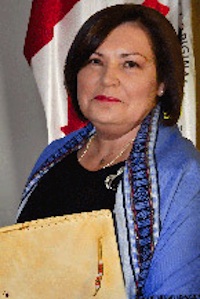 NEWS RELEASE
NEWS RELEASE
CONGRESS OF ABORIGINAL PEOPLES
*************************
National Chief Lavallée calls for an open and fair election process for Aboriginal peoples living off-reserve
OTTAWA (August 27, 2013) – National Chief of the Congress of Aboriginal Peoples, Betty Ann Lavallée CD, (Ret’d), issued the following statement calling for the leadership of Attawapiskat to postpone the election until all members of the community living off-reserve are guaranteed reasonable access to vote in this election.
“I am calling for the leadership at Attawapiskat to postpone the election until a fair and transparent electoral process is established that guarantees the right for the off-reserve members of Attawapiskat to vote in this election,” stated Chief Lavallée [shown]. “My concern is how difficult it will be for those living off-reserve who want to vote, but are expected to cast their vote in person. It’s not fair or reasonable that in the 21st century options like mail-in-ballots are not in place. I have always believed that the right to vote is a fundamental human right that cannot be denied to members of a community, who for some reason or another are living away from their reserve. This is unfair - it is wrong and it is against the law.”
In 1999, the Supreme Court declared in the case of John Corbière that all Indian bands holding elections under the Indian Act would be required to extend voting rights to band members living off-reserve.
Following the decision, the Supreme Court gave Indian Bands 18 months to consult to either develop custom election codes that are open and transparent or follow the rules as established under the Indian Act and the Indian band Election Regulations.
“The 1999 Supreme Court ruling made it clear that off-reserve Aboriginal peoples have the right to vote,” added Chief Lavallee. “However, in spite of Corbière, we believe that a large majority of off-reserve Aboriginal peoples still cannot vote. That needs to change and we are hopeful that Bill S-6 which has been referred to the Standing Committee on Aboriginal Affairs and Northern Affairs will put in place safeguards to ensure open and transparent election processes and redress mechanisms in the event of a dispute of elections, as well as allowing an Aboriginal person living off-reserve to run in elections.”
“Justice is Equality,” a study commissioned by the Congress of Aboriginal Peoples in 2007, noted several fundamental flaws in many of the electoral codes in place for over half of the six hundred plus reserve communities in Canada.
The report sought to review electoral codes in select First Nations communities to determine the extent of their compatibility with several federal statutes, including the Canadian Charter of Rights and Freedoms, the Canadian Human Rights Act, the Privacy Act, and the Personal Information and Electronic Documents Act.
The study undertook to determine the extent of First Nations communities’ compliance with the Supreme Court of Canada’s 1999 Corbiere decision, which affirmed the rights of First Nations citizens living away from reserves to vote in elections for Chief and Band Council.
“For everyone’s benefit, and to ensure that election results are seen as credible, I ask for a postponement to allow for reasonable accommodation for members living off-reserve who want a say on how their community is run,” concluded National Chief Lavallée. “I am also calling for a comprehensive review of the Corbière decision because we need to know exactly what has happened since 1999, and if off-reserve Aboriginal peoples are now able to vote without any impediment or unjust restrictions.”
Since 1971, the Congress of Aboriginal Peoples (formerly known as the Native Council of Canada) has been the National Representative Organization and the National Voice for the constituency and their Affiliate Organizations making up the Congress’ family of advocates for the Off-Reserve, Non-Status, and Status Indians, Métis and Southern Inuit Aboriginal Peoples living in urban, rural remote and isolated areas throughout Canada.
Today, over 70 percent of Aboriginal Peoples live off-reserve.
*************************